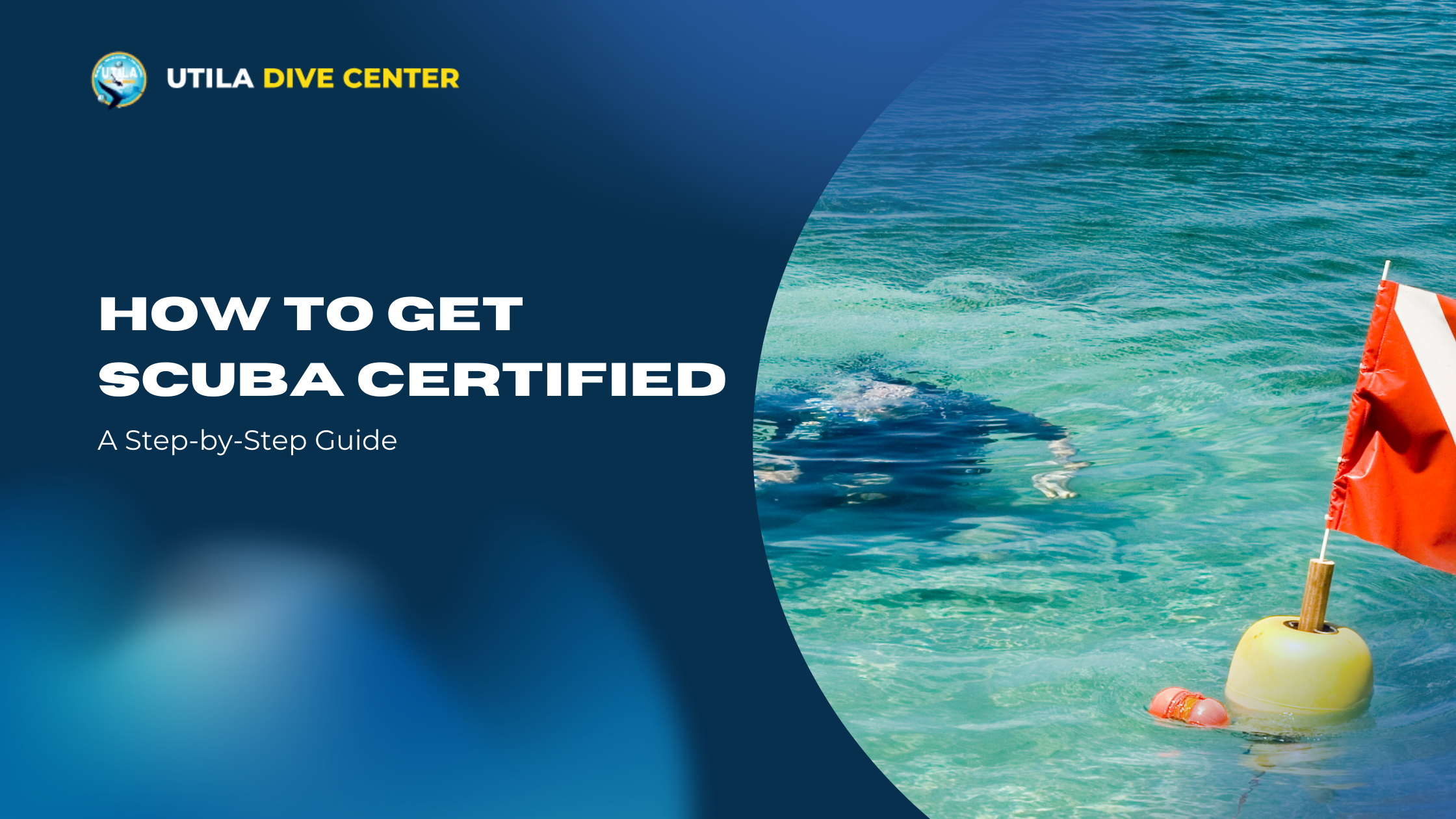
How To Get SCUBA Certified
How to Get SCUBA Certified: A Step-by-Step Guide
By: Manny Lagos | Date: 2024-11-08T11:44:20.242Z
SCUBA diving is undoubtedly one of the most thrilling ways to connect with nature and experience the ocean’s beauty. But it's not as simple as strapping on a tank and diving in - one needs to be prepared by undergoing the required training. That’s why getting your SCUBA diving license is a must before you start your underwater adventures.
Whether you’re diving for fun or want to become a certified instructor, this guide will walk you through every step:
- Choosing the Right Dive School
- Starting your SCUBA diving lessons
- How long does it take to get dive-certified
- What to expect in a diving course
- And more…
By the end of this guide, you’ll have a clear idea of where to start, what to do, and how to get SCUBA certified.
What Is SCUBA Certification?
Understanding the SCUBA Diving License
The SCUBA certification shows you've obtained the proper training and can dive safely and responsibly. Several organizations offer them, such as PADI (Professional Association of Diving Instructors). Without it, you can’t rent gear or join most dive trips. But if you manage to get it, you’re all set to rent diving equipment, join dive trips, and explore dive sites with a buddy. The best part is that you are certified to dive anywhere around the world without supervision. However, diving with a guide who knows the local area is always the better idea.
Why Do You Need to Get Certified?
You might think, “Why can’t I just rent the gear and jump in?” Well, diving safely requires more than underwater swimming skills. It’s about mastering buoyancy and handling your equipment properly, and you never know what emergency you might face underwater. You must also know how to deal with them.
With thorough SCUBA diving lessons and certification, you’ll have the confidence and skills to protect yourself and your dive buddy. It also gives you access to more dive locations and makes your diving experience more enjoyable and stress-free!
Steps to Getting SCUBA Certified
Getting the confidence and skills to dive safely isn’t just about theory; it’s about putting that knowledge into practice. That’s exactly what the SCUBA certification process is all about. Here’s a step-by-step guide to walk you through the entire process!
1. Find a Certified Dive School
Researching Local Dive Schools
Find a solid dive school that’s backed by organizations like PADI, SSI, or NAUI. But why does this matter? These organizations have strict standards that guarantee quality training. This means you’ll get the right guidance, every step of the way. You can take Utila Dive Center, for example. You have a wide range of courses that are offered to beginners and experienced divers alike.
Location
Where you get certified makes a huge difference in your overall experience. Go for locations with calm, clear waters and rich marine life, like Utila, the Caribbean, or the Florida Keys. These places are beginner-friendly and offer ideal learning conditions. Plus, you get to explore beautiful underwater landscapes as you train!
Bonus tip: Book ahead of time if possible! Ask about the instructors' backgrounds to feel more confident in your choice.
2. Complete the Online Theory Lessons
The first step in your SCUBA certification journey is diving into the theory lessons. Don’t worry, it’s more interesting than it sounds! These lessons set the foundation for everything you’ll need underwater!
A Sneak-Peak of What You’ll Learn:
- Dive Theory: Understanding pressure, buoyancy, and how the underwater environment affects your body.
- Dive Equipment: Knowing how to assemble, use, and maintain your mask, fins, BCD (Buoyancy Control Device), and regulator.
- Safety Protocols: Learning emergency procedures and underwater communication signals.
Once you’ve wrapped up the theory lessons, you’ll take a final exam. It’s nothing to stress about though, it’s just to assess your understanding before you get your body wet.
Bonus tip: If you're getting certified while on vacation, the option to e-learn theory lessons at an additional cost can save you time. It lets you finish the coursework at home, so you can dive straight into the in-water training when you arrive at the dive center!
3. Attend Confined Water Dives (Pool Sessions)
Ready to take the plunge? Confined water dives are usually held in a swimming pool or calm, shallow bay. This is where you’ll start learning essential diving skills. Some of the key skills include:
- Breathing underwater
- Clearing your mask
- Managing buoyancy and maintaining a stable position
- Recovering your regulator if it gets knocked out of your mouth
- Sharing air with a buddy during emergencies
- Using dive instruments to track depth and air supply
Why Pool Sessions Are Important?
Practicing in a controlled environment helps you get comfortable with your gear and master key skills in a safe setting. The goal is to make these skills second nature, so you’re ready to handle real-world situations when you transition to open water.
Bonus tip: These sessions may feel repetitive, but that’s what builds muscle memory and confidence. These sessions make you fully prepared for open-water dives!
4. Open Water Dives for Certification
This is where the real fun begins! Open water dives are the final step of your certification journey and your chance to dive into the real ocean (or lake) environment. You’ll typically complete four dives over two days, putting all the skills you’ve learned to test. Your instructor will be right there, guiding you through exercises like underwater navigation, buoyancy control, and tackling minor challenges.
How Many Dives Are Required?
You’ll need to complete four open-water dives in total. Each dive helps you build confidence and refine your skills in different depths and currents. By the end of your last dive, you’ll have proven your abilities and will be able to dive up to 60 feet deep with a buddy. You’re officially a certified diver once you pass this!
How Long Does It Take to Get SCUBA Certified?
Course Duration and Flexibility
At Utila Dive Center, getting certified is all about flexibility and quality training. The standard Open Water Diver course takes about 4.5 days. This course gives you plenty of time to build your skills comfortably. For those with tighter schedules, the GoFAST option lets you complete the course in just 3.5 days. However, it’s recommended not to rush through the certification process. Remember, it's important to grasp the training completely for better safety and fun.
- The standard course is spread over 4.5 days and is ideal for a relaxed and thorough certification experience.
- The GoFAST course is spread over 3.5 days and is perfect for those on a tighter schedule but still focused on quality training.
Can You Get Certified in One Trip?
Absolutely! Many dive centers, like Utila Dive Center, help you get certified in just one trip. This means you can tackle the entire certification process in one go. It’s quick, efficient, and gets you ready in no time!
What Does a Diving Course Include?
Theory Lessons: Understanding Dive Physics and Safety
Here, you’ll cover everything from how pressure affects your body to planning dives safely and mastering underwater communication signals. It’s the knowledge that makes every dive safe and enjoyable.
Practical Skills: Equipment Use, Buoyancy Control
In your pool sessions, you’ll put theory into action. Practice clearing your mask, recovering your regulator, and mastering buoyancy control. It’s all about building comfort and confidence before hitting the open water!
How to Handle Underwater Emergencies
Emergencies happen, but staying calm is key! You’ll master how to deal with issues like a lost regulator, low air, or a flooded mask. You’ll practice sharing air with your buddy, performing safe ascents, and managing buoyancy like a pro. These skills aren’t just for emergencies, they help you feel more confident and in control underwater. So, when things don’t go as planned, you’ll know exactly what to do and keep cool under pressure!
Costs and Benefits of Getting SCUBA Certified
The cost of getting SCUBA certified can vary based on the location and course structure. Utila Dive Center, however, is famous for being one of the most affordable places to get certified.
Expanding Your Diving Experience with Advanced Courses
Why stop at the basics? Once you’re a certified Open Water Diver, there are numerous advanced courses to consider:
- Advanced Open Water Diver: Learn to dive deeper and improve your underwater navigation skills.
- Rescue Diver: Develop the skills to assist other divers and handle emergencies.
- Specialty Courses: Get trained in specialties like Night Diving, Wreck Diving, or Enriched Air (Nitrox) for even more exciting dives.
These courses aren’t just about more skills—they open up a world of new dive adventures and experiences!
Congratulations, you’re now a certified SCUBA diver!
What’s Next After Getting Certified?
Now that you know how to get SCUBA certified and have your SCUBA diving license, the adventure has just begun! Consider joining a local dive club to connect with fellow divers, share experiences, and join group dives. Plan trips to iconic locations like the Great Barrier Reef, the Red Sea, or Belize’s Blue Hole. There’s a whole underwater world waiting for you in these places!
Get Certified with Utila Diving Center
With a team of passionate instructors, state-of-the-art facilities, and breathtaking dive sites, we’ve got everything you need to explore the underwater world safely and complete the diving course confidently. Whether you’re a beginner or looking to advance your skills, we’ll guide you every step of the way.
Click here to get all your questions answered about getting SCUBA-certified.
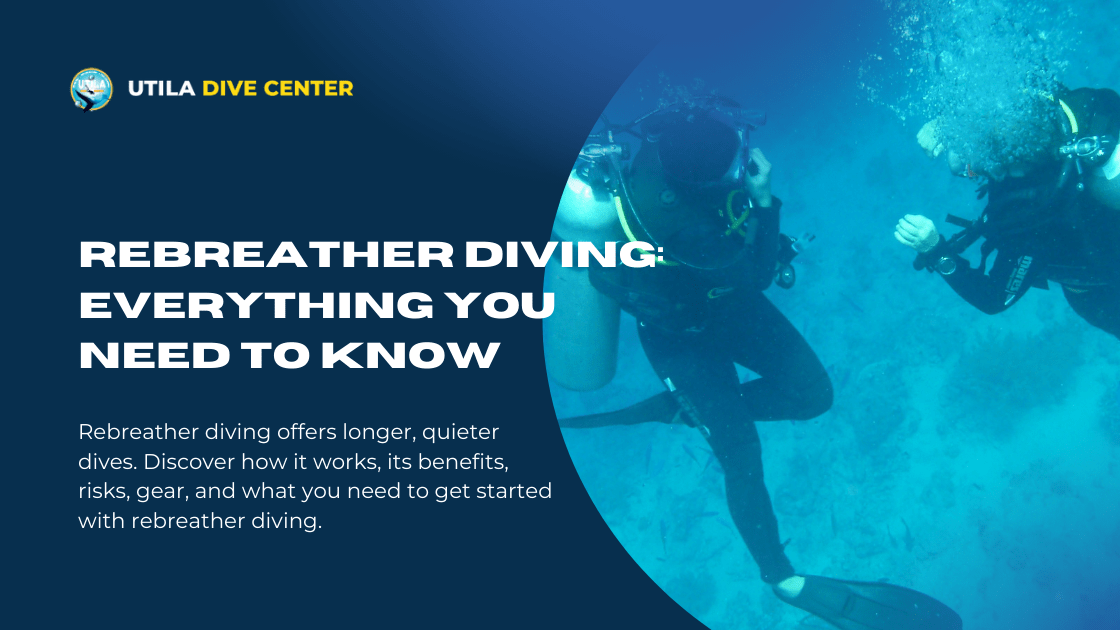
Rebreather Diving: Everything You Need to Know
Rebreather diving offers longer, quieter dives. Discover how it works, its benefits, risks, gear, and what you need to get started with rebreather diving.
Read more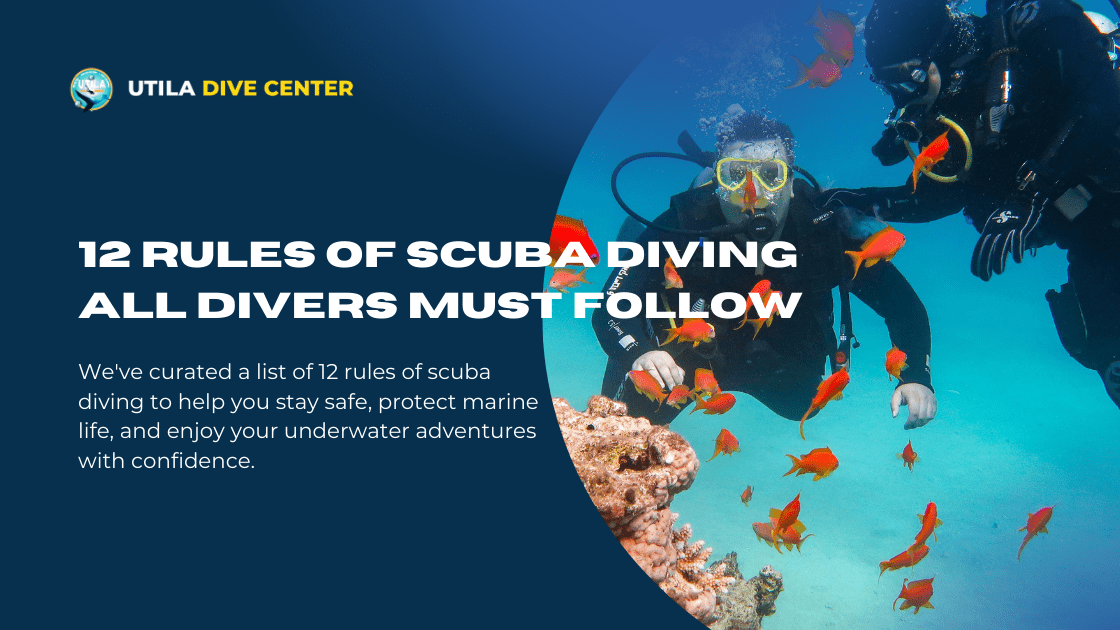
12 Rules of Scuba Diving All Divers Must Follow
We've curated a list of 12 rules of scuba diving to help you stay safe, protect marine life, and enjoy your underwater adventures with confidence.
Read more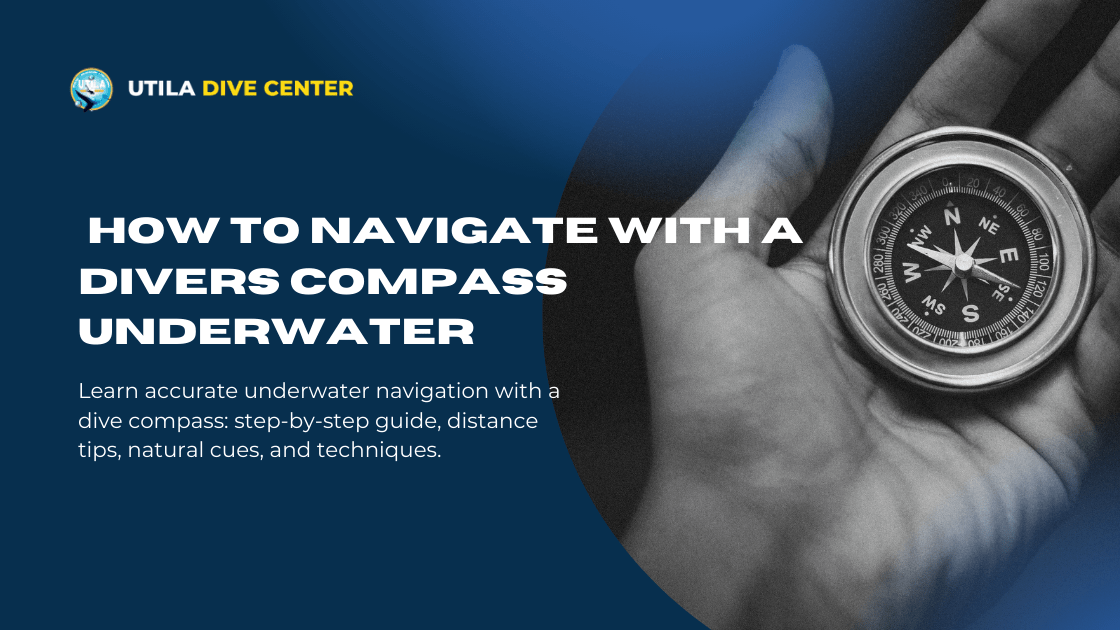
How to Navigate With a Divers Compass Underwater
Learn accurate underwater navigation with a dive compass: step-by-step guide, distance tips, natural cues, and techniques.
Read more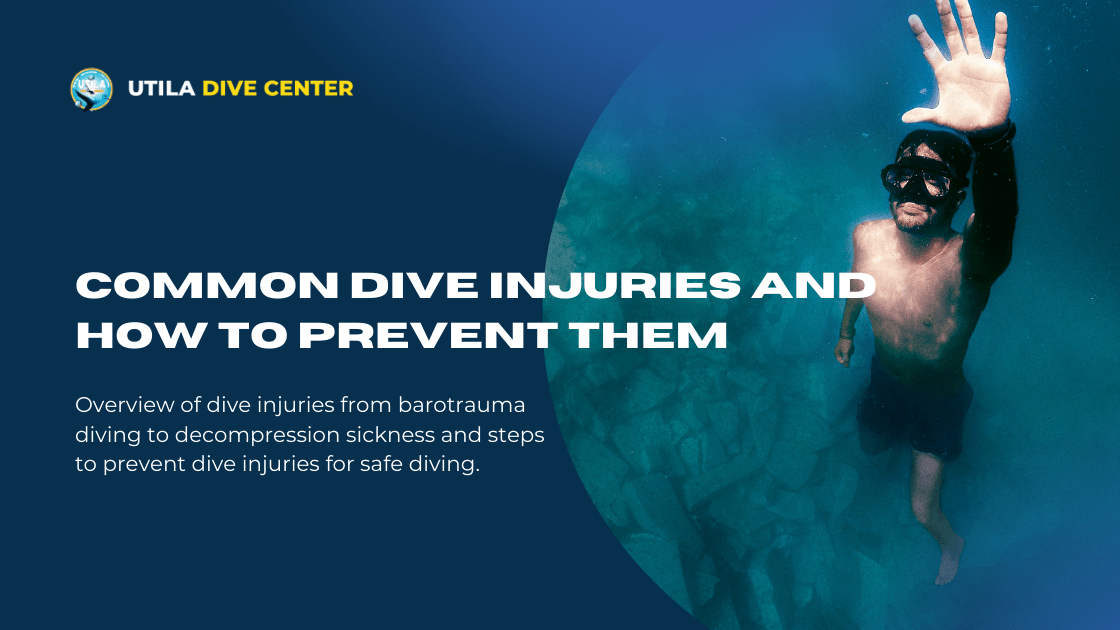
Common Dive Injuries and How to Prevent Them
Overview of dive injuries from barotrauma diving to decompression sickness and steps to prevent dive injuries for safe diving.
Read more